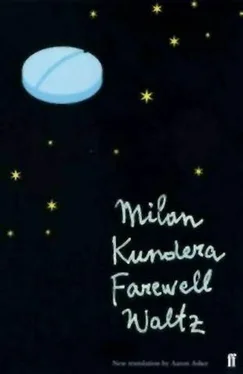Klima was silent, and he caressed Ruzena's cheek. Brought out of her reflections, she noticed that he was smiling. He said that they should take another ride in the country, for this brasserie table was separating them like a wall.
She was afraid. Frantisek was still behind the tree in the park with his eyes fixed on the brasserie window. What would happen if he were to harass them as they were leaving? What would happen if he were to make a scene, as he had on Tuesday?
"I'll pay for the two brandies now," Klima said to the waiter.
Ruzena took a glass tube out of her handbag.
The trumpeter gave the waiter a bill and with a magnanimous gesture refused the change.
Ruzena opened the tube, shook a tablet into the hollow of her hand, and swallowed it.
When she closed the tube again, the trumpeter turned to her and looked her in the face. He moved both his hands toward hers, and she let go of the tube in order to feel the touch of his fingers.
"Come, let's go," he said, and Ruzena got up. She saw Jakub's gaze, fixed and hostile, and she looked away.
Once they were outside, she looked anxiously toward the park, but Frantisek was no longer there.
Jakub got up and, taking his half-full glass with him, sat down at the vacated table. With satisfaction he
cast a glance through the window at the reddening trees in the park, and again he thought that these trees were like a fire into which he was throwing his forty-five years of life. Then his glance slipped to the surface of the table, and next to the ashtray he saw the forgotten glass tube. He picked it up and examined it: on the label was the name of a drug unfamiliar to him, with a penciled addition: "Three times a day." The tablets inside the tube were pale blue. That seemed odd to him.
These were the last hours he was spending in his country, and the smallest events were being charged with extraordinary meaning and being changed into an allegorical show. What does it mean, he asked himself, that on this very day someone has left on a table for me a tube of pale-blue tablets? And why should it have been left here by that very woman, Political Persecution's Heiress and Hangman's Assistant? Was she trying to tell me that the need for pale-blue tablets was not yet over? Or was she really trying, by this allusion to poison tablets, to express her undying hatred? Or, still more, was she trying to tell me that by leaving the country I am showing the same resignation I would be showing if I were to swallow the pale-blue tablet I carry in my jacket pocket?
He searched in his pocket, pulled out the tiny wad of tissue paper, and unfolded it. Now that he was looking at it, his own tablet seemed to him a shade darker than those in the forgotten tube. He opened the tube and shook a tablet into his hand. Yes, his was a bit darker
and smaller. One after the other, he put the two tablets into the glass tube. Now that he was looking at them together, he saw that at first sight one would be unable to tell the difference. On top, above the harmless tablets probably intended to treat the mildest of ailments, death lay concealed.
At that moment Olga approached the table. Jakub quickly capped the tube, put it next to the ashtray, and rose to greet his friend.
"I just ran into Klima, the famous trumpeter! Is that possible?" she asked, sitting down beside Jakub. "He was with that horrible female! She gave me a hard time today at the baths!"
But she broke off, for at that moment Ruzena planted herself at their table and said: "I left my tablets here."
Before Jakub could reply, she noticed the tube next to the ashtray and reached for it.
But Jakub was quicker and grabbed it first.
"Give me that!" said Ruzena.
"I want to ask you a favor," said Jakub. "May I have one of those tablets?"
"Sorry! I haven't got time!"
"I'm taking the same drug, and…"
"I'm not a walking pharmacy," said Ruzena.
Jakub tried to remove the cap, but Ruzena prevented him by abruptly reaching for it. Jakub instantly grasped the tube in his fist.
"What's this all about? Give me those tablets!" the young woman shouted at him.
Jakub looked her in the eye; slowly he opened his hand.
Over the rhythmic clatter of the wheels, the futility of her trip seemed clear. She was sure at any rate that her husband was not in the spa town. Then why was she going there? Was she taking a four-hour train trip only to find out what she already knew? She was not acting on a rational intention. It was an engine within her, which had taken to turning and turning and which there was no way of stopping.
(Yes, at this moment Frantisek and Kamila are being propelled into the space of the story like two rockets guided from a distance by blind jealousy-but what guidance can blindness provide?)
Rail connections between the capital and the spa town were not the simplest, and Mrs. Klima had to change trains three times before she got off, exhausted, at an idyllic station filled with display advertisements recommending the locality's healing springs and miraculous muds. She took the poplar-lined avenue that led from the station to the thermal baths, and, arriving at the colonnades, she was struck by a hand-painted poster on which her husband's name appeared
in red. Surprised, she stopped and under her husband's name read two other men's names. She couldn't believe it: Klima hadn't lied to her! It was exactly what he had told her. In these first few seconds she experienced great joy, feeling again the trust she had lost long ago.
But her joy didn't last long, for she immediately realized that the existence of the concert was no proof of her husband's fidelity. He certainly must have agreed to perform in this isolated spa town in order to revisit a woman. And suddenly she became aware that the situation was actually worse than she had imagined, that she had fallen into a trap:
She had come here to make sure that her husband was elsewhere, and thus indirectly to prove him guilty (yet again, for the umpteenth time!) of infidelity. But now things had changed: She was not going to catch him in a blatant lie but catch him ( directly, with her own eyes) in an act of infidelity. Whether she wanted to or not, she was going to see the woman with whom Klima had spent the day. This thought nearly staggered her. Of course she had long been certain that she knew everything, but until now she had never seen anything (any of his mistresses). To tell the truth, she knew nothing at all, she only believed she knew, and she gave this conjecture the weight of certainty. She believed in her husband's infidelity the way a Christian believes in God's existence. But the Christian believes in God with the absolute certainty that He will remain unseen. The thought that today she was going to see Klima with a
woman made her feel the terror a Christian would feel on receiving a phone call from God announcing that He was coming over for lunch.
Her entire body was overwhelmed by anxiety. Then she heard someone call her name. She turned around and saw three young men standing under the colonnades. They wore sweaters and jeans, and their bohemian style contrasted sharply with the dreary tidiness of the other spa clientele strolling by. They greeted her with laughter.
"What a surprise!" she exclaimed. They were film people, friends from her days onstage with a microphone.
The tallest one, a director, quickly took her by the arm: "How pleasant it would be to know that you came because of us…"
"But you came here because of your husband…" the assistant director said sadly.
"Just our lousy luck!" said the director. "The most beautiful woman in the capital, and that lout of a trumpeter keeps her in a cage so you don't get to see her for years."
Читать дальше










